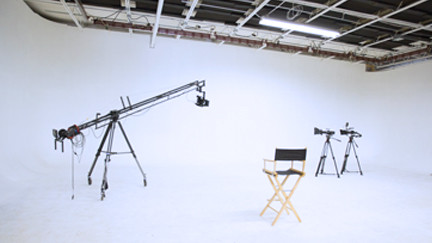The Top Five Things to Consider When Renting a Studio or Soundstage

With the increase of film production in Georgia there has been a flurry of studios and soundstages popping up all over Atlanta to grab a cut of the business. Many are built by those with no background in studio acoustics or construction. On-premise equipment is often subpar to what would be expected of a professional stage for rent.
We work with Atlanta’s most proficient technical crew. From our set designers to our lighting and sound crew, these are people that step into a studio with discerning eyes and ears, examining every nuance before giving any studio space the green light. We’ve compiled a checklist below of things we look for when considering our next studio home. Your clients look to you to have their best interests in mind. Let us help you put your best foot forward and shine through.
1. Are you recording audio?
This is a HUGELY important consideration and one where experience absolutely comes in. Many new studios claim that audio can be recorded on their stages. Sure, it can. It can be recorded at a train station, an airfield, even a busy mall. Would that be considered useable audio? Not likely. More than a few Atlanta studios we’ve been in that were marketed as soundstages failed to pass our sound engineers standards. From noisy air handlers and metal ceilings to the sound of high heels walking down the neighboring hallway, we’ve heard it. Correctly sound-proofing a studio takes experience specifically in studio production. We have first-hand experience in studio construction. That’s why we’re the best at what we do.
2. Is the studio a freestanding dedicated space or is it a shared or multi-tenant building?
Many pop-up studios have located themselves in buildings where other tenants and businesses reside. We have first-hand experience in this area. These multi-tenant situations rarely work out. All it takes is one new tenant on move-in day or a large shipment arrival to wreck a studio shoot. In these multi-tenant situations, the studio will do its best to control the environment by sending memos to tenants or putting up signage around the studio perimeter announcing a shoot day. But overtime, communication breaks down or other tenants just tire of the inconvenience to their own business. Look for a dedicated stand-alone structure.
3. If renting a cyc wall, what is included and what other fees may be involved?
Look for a pre-lit studio. Pre-lit is typically a better option. Expect an additional charge to apply if it is pre-lit, but this charge pays for itself in both time and money. The fee is typically less than if you had rented lighting. Plus, you save the additional time and cost of having your lighting crew come in extra early to light the full area.
a. If it is pre-lit, what lighting is used?
This is a question better asked of the studio manager by your lighting director or gaffer. You need someone knowledgeable of lighting and electrical, someone who understands what lights to use where and when. A studio we once associated with was recently bought and overhauled. On their website they still advertise their cyc stage as being pre-lit. It is… and with the wrong type of lighting fixtures. Imagine, on shoot day you find that the savings you thought you would have with a pre-lit cyc wall is now being spent on additional lighting provided by your gaffer…for an additional fee.
b. What are the painting or retouch fees?
Every studio will charge you something for changing the color of the stage. A retouch fee also may apply. This fee typically depends on the condition of the current paint at the time of your booking. If the stage has just been painted and shows no wear or marring, you will likely pay a retouch fee. Sometimes it’s a flat fee. Other times it is based on the area to be retouched.
4. Interview the studio manager the same as you would interview someone applying for a job with you.
Why would you not? You’re putting a good bit of money into the hands of someone who is to have your best interests at heart. How long have they been a studio manager? Where did they work before? Most studio managers will have some sort of production background. That doesn’t mean that they know how to run a studio. Managing a studio is a tremendous responsibility. A good studio manager will ask in-depth questions about your production. They will have already anticipated your every need in and outside of that production. They can answer every question quickly. If you need anything at all, they either have it or know where to get it. They should stand by during your production to assure everything goes smoothly. A light blow? They have spare bulbs. You’re short electrical cables? They have more. They know the electrical and the capacity of every circuit and plug. They speak production lingo. Put any of your crew in front of them and they can speak production tongue (which really is a language all its own). They understand lighting, sound, cameras and accessories. They are an encyclopedia of production knowledge. THAT’S the type of studio manager that you can be sure has your every base covered. You deserve no less. But more importantly, neither does your client.
5. COVER YOUR BASES ON THE LEGAL SIDE!!!!!
Do your due diligence. Read the studio contract THOROUGHLY. Take the time to understand just what they do and do not cover. What is the cancellation policy? Are they insured and is there proof that it is current? Ask to see a copy of their COI (certificate of insurance). Then go as far as calling their insurer to verify they are current in payments. If you have a pre-set day factored in, is it safe to leave equipment behind? What if a fire, flood or theft takes place? What is their refund policy? That’s a good one to check on before you find yourself asking for a refund because of this or that.
Renting a studio is a big
thing. Rent responsibly and with forethought. We have a saying here that we know to be
fact.
“You are only as good as your last production.”
Make sure that your last studio production left the best impression on your client. Cover your bases, do your due diligence. You and your client deserve a smooth production. Armed with these five tips, you can make that studio reservation call with confidence.
atlanta studio rental cyc stage cyc wall green screen soundstage stage studio white cyc
